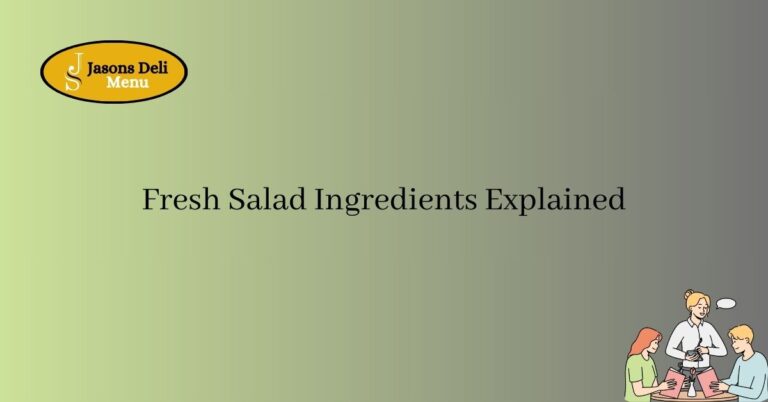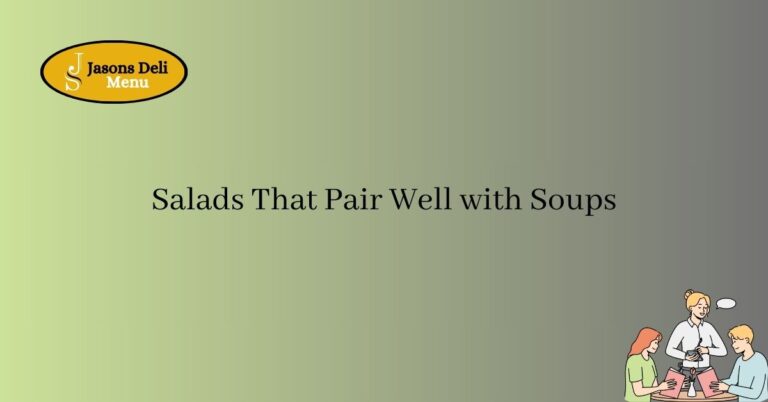Salads for Special Dietary Needs
Salads for special dietary needs are essential for individuals seeking nutritious and satisfying meal options that align with their specific health requirements. Whether one is managing food allergies, adhering to a gluten-free diet, or following a vegan lifestyle, salads provide a versatile foundation for delicious and health-conscious eating. Incorporating a variety of fresh vegetables, fruits, and proteins, these salads can be easily customized to meet different dietary preferences while ensuring they remain flavorful and appealing. At establishments like Jason’s Deli, options abound to cater to diverse dietary needs, making it easier for everyone to enjoy a wholesome meal without compromise.
Understanding the importance of including salads in special dietary plans is crucial for maintaining overall health. Many salads can be tailored to eliminate allergens, reduce carbohydrates, or enhance protein intake, depending on individual needs. With the right selection of ingredients, salads can offer a well-balanced meal that supports energy levels and nutritional goals. Jason’s Deli Menu showcases a variety of salads that can serve these needs, encouraging diners to make informed choices while enjoying their meals. This flexibility allows for creative combinations, ensuring that everyone can find a salad that fits their lifestyle while enjoying the delicious flavors they desire.
Delicious Salads for Unique Dietary Needs
Salads play an essential role in healthy dietary plans, providing a wealth of vitamins, minerals, and dietary fiber. They are versatile, allowing for customization to suit individual tastes and dietary restrictions. Incorporating salads into daily meals can enhance overall nutrition, support weight management, and improve digestion. With a focus on fresh ingredients, salads can serve as a primary dish or a side, making them ideal for various dietary needs. They can be tailored to fit specific nutritional goals, whether someone is looking to increase their vegetable intake or manage their calorie consumption. Overall, salads can be a delicious and satisfying part of any balanced diet.
Customizing Salads for Food Allergies
When it comes to creating salads for individuals with food allergies, it’s crucial to be mindful of common allergens that may be present in typical salad ingredients. Common allergens include nuts, dairy, gluten, and shellfish, among others. Identifying these allergens is the first step in ensuring a safe and enjoyable meal for everyone. By substituting allergenic ingredients with safe alternatives, you can create delicious and safe salad options. For example, using sunflower seeds instead of nuts or dairy-free dressing can accommodate those with specific allergies. It’s also important to communicate clearly about ingredients to avoid cross-contamination.
Identifying Common Allergens in Ingredients
To effectively manage food allergies in salads, one must first identify common allergens found in various ingredients. For instance, many dressings contain dairy or eggs, while croutons may contain gluten. Leafy greens, vegetables, and fruits are generally safe, but always check for pesticide residues or cross-contamination. Understanding ingredient labels and being aware of hidden allergens is essential. Assembling salads with allergen-free ingredients ensures that everyone can enjoy a healthy meal without worry.
Creating Allergen-Free Salad Recipes
Crafting allergen-free salad recipes is easier than it may seem. Start with a base of fresh greens like spinach or arugula, then add a variety of vegetables such as bell peppers, cucumbers, and carrots. Incorporate protein sources like chickpeas or grilled chicken, while avoiding nuts and dairy. For flavor, use homemade vinaigrettes made from olive oil, vinegar, and herbs, steering clear of pre-packaged dressings that may contain allergens. Additionally, experimenting with spices can add depth and excitement to the dish without introducing allergens.
Gluten-Free Salad Options
For those who need to follow a gluten-free diet, selecting the right ingredients is key to crafting delicious salads. Gluten is commonly found in wheat products, so avoiding croutons and certain dressings that contain wheat is essential. Instead, use gluten-free grains like quinoa or brown rice as base ingredients for a heartier salad. Fresh vegetables, fruits, and proteins can be combined to create a satisfying meal. It’s also important to check labels on any packaged ingredients to ensure they are certified gluten-free to avoid cross-contamination.
Choosing Gluten-Free Ingredients
Choosing gluten-free ingredients for salads involves being mindful of what goes into your dish. Fresh produce is naturally gluten-free, and proteins such as grilled chicken, tofu, or beans are excellent choices. Adding gluten-free grains like quinoa, millet, or buckwheat can enhance texture and provide additional nutrients. When selecting dressings and toppings, read labels carefully to ensure they are free from gluten. With a little creativity, gluten-free salads can be just as flavorful and satisfying as their traditional counterparts.
Popular Gluten-Free Salad Combinations
There are numerous delicious gluten-free salad combinations to explore. A classic option is a quinoa salad mixed with diced cucumbers, tomatoes, and feta cheese, drizzled with a lemon vinaigrette. Another tasty choice is a mixed green salad topped with grilled chicken, avocado, and a mango salsa. For a refreshing twist, consider a watermelon and feta salad with mint. These combinations not only cater to gluten-free dietary needs but also provide a burst of flavors that can please any palate.
Vegan-Friendly Salad Ingredients
Vegan salads are a wonderful way to incorporate a variety of plant-based ingredients, ensuring they are both nutritious and satisfying. Leafy greens can be combined with an array of vegetables, legumes, and seeds to create a well-rounded dish. It’s crucial to include protein sources such as chickpeas, black beans, or lentils to provide essential amino acids. Tofu or tempeh can also be added for texture and nutrition. With a focus on colorful vegetables and creative dressings, vegan salads can be exciting and fulfilling.
Protein Sources for Vegan Salads
Protein is a vital component of any salad, especially for those following a vegan diet. Incorporating plant-based protein sources like lentils, beans, and chickpeas not only boosts nutritional value but also enhances satiety. Quinoa is another great option, providing a complete protein. Nuts and seeds, like pumpkin or sunflower seeds, can also add crunch and additional protein. By thoughtfully combining these ingredients, vegan salads can be both diverse in flavor and rich in nutrients.
Creative Vegan Salad Ideas
When it comes to vegan salads, creativity knows no bounds. One idea is a roasted vegetable salad featuring seasonal veggies like sweet potatoes, Brussels sprouts, and bell peppers, tossed with a tahini dressing. Another option could be a colorful rainbow salad, incorporating a variety of vegetables, grains, and a citrus dressing for a refreshing taste. A Mediterranean-inspired salad with cucumbers, tomatoes, olives, and chickpeas offers a satisfying meal while adhering to vegan principles. These creative ideas ensure that vegan salads are anything but boring!
Enhancing Nutritional Value of Salads
To enhance the nutritional value of salads, one can incorporate superfoods that are rich in vitamins, minerals, and antioxidants. Ingredients like kale, spinach, and avocados are not only delicious but also packed with nutrients. Adding seeds such as chia or flaxseed can provide healthy fats and fiber. Additionally, incorporating colorful fruits like berries or pomegranates can elevate the antioxidant content of a salad. By selecting nutrient-dense ingredients, salads can become a powerhouse of health benefits.
Incorporating Superfoods in Salads
Incorporating superfoods into salads is an effective way to boost health benefits. Popular superfoods include kale, quinoa, and blueberries, each offering unique nutritional profiles. For example, kale is a leafy green high in vitamins A, C, and K, while quinoa is a gluten-free grain rich in protein. Adding a handful of berries can increase antioxidant levels, promoting overall health. By blending these superfoods into salads, you can create dishes that are not only tasty but also contribute positively to your health.
Balancing Macronutrients in Salad Meals
Balancing macronutrients in salads involves combining the right proportions of carbohydrates, proteins, and fats to create a satisfying meal. Start with a base of leafy greens for fiber, then add a protein source like beans or tofu to promote satiety. Whole grains or starchy vegetables can serve as healthy carbohydrates, while healthy fats can be incorporated through avocados or olive oil-based dressings. This balance ensures that salads are not only nutritious but also provide lasting energy and satisfaction.
Salad Recipes for Weight Management
Salads can be an excellent choice for those looking to manage their weight, as they are typically low in calories and high in nutrients. Focus on incorporating low-calorie ingredients such as leafy greens, cucumbers, and tomatoes. Adding high-fiber components, like beans or whole grains, can help keep you full longer. Dressings should be used sparingly, opting for lighter versions made from vinegar and spices. With thoughtful ingredient choices, salads can support weight management goals without sacrificing flavor.
Low-Calorie Salad Ingredients
Choosing low-calorie salad ingredients is key to creating weight-friendly meals. Leafy greens, such as romaine or spinach, are low in calories but high in volume, making them perfect bases. Other low-calorie vegetables include cucumbers, radishes, and bell peppers. Incorporating fruits like strawberries or apples can add natural sweetness without a lot of calories. For protein, opt for lean options like grilled chicken or plant-based proteins, ensuring the meal remains satisfying yet low in calories.
Meal Prep Ideas for Healthy Salads
Meal prepping healthy salads can save time and ensure you have nutritious options ready to go. Start by washing and chopping vegetables in advance, storing them in airtight containers. Prepare grains like quinoa or brown rice ahead of time for easy additions. When ready to eat, simply combine your prepped ingredients with dressing to keep everything fresh. Consider creating individual salad jars, layering ingredients from heaviest to lightest to prevent sogginess. This makes it easy to grab a healthy meal on the go while sticking to dietary goals.
Salads at Jason’s Deli
Jason’s Deli offers a wide range of salads that cater to special dietary needs, making it an excellent choice for diverse dietary preferences. Their menu includes options for gluten-free, vegan, and allergen-free salads, ensuring there’s something for everyone. Customers can explore various fresh ingredients, allowing for customization to fit their unique dietary plans. With a commitment to using high-quality ingredients, Jason’s Deli ensures that every salad is not only nutritious but also flavorful.
Frequently Asked Questions
This section addresses common inquiries regarding salads designed for special dietary needs. It aims to provide clarity and helpful information to enhance understanding and enjoyment of nutritious meal options that align with various health requirements.
What types of salads cater to special dietary needs?
Salads at Jason’s Deli are designed to accommodate various dietary requirements, including gluten-free, vegan, and allergen-free options. Each salad can be customized with a selection of fresh vegetables, fruits, and proteins, allowing for a nutritious meal tailored to individual preferences and health goals.
Are salads suitable for gluten-free diets?
Yes, many salads available at Jason’s Deli can be made gluten-free. By selecting ingredients that do not contain gluten, diners can enjoy a delicious and safe meal. Options include fresh vegetables, proteins, and gluten-free dressings, ensuring a satisfying and healthy dining experience.
Can salads be made vegan?
Absolutely! Jason’s Deli offers a variety of salads that can be easily modified to fit a vegan diet. By omitting animal products and choosing plant-based ingredients, such as vegetables, legumes, and nuts, individuals can enjoy flavorful salads that align with their lifestyle choices.
How can salads help with managing food allergies?
Salads can be tailored to exclude specific allergens, making them a safe choice for individuals with food allergies. Jason’s Deli is mindful of cross-contamination and offers options that allow diners to enjoy a meal without concerns, ensuring a worry-free dining experience while meeting dietary restrictions.
What nutritional benefits do salads provide?
Salads are packed with essential vitamins, minerals, and antioxidants, promoting overall health. They can aid in weight management, enhance energy levels, and provide a balanced meal when prepared with a variety of fresh ingredients. Choosing the right combinations can help individuals meet their unique nutritional needs.






